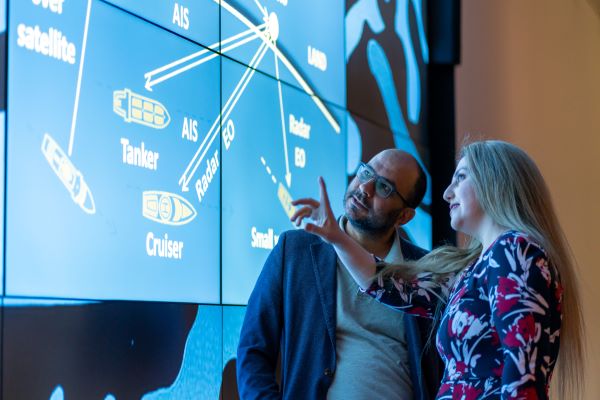Unleashing the Power of AI Across Disciplines
At the Industrial AI Research Centre, we drive innovation and implementation of research-driven solutions across a wide range of industries. Our diverse research capabilities span an array of disciplines, allowing us to understand and model complex, interconnected systems with expertise and comprehensive insight.
Our research capabilities are vast, covering areas such as AI, machine learning, interoperability, ontology engineering, natural language processing, mathematics, statistical modelling and inference, data analytics, signal processing, satellite systems, and optimisation. By leveraging the power of these disciplines, we create novel solutions that push the boundaries of what is possible and equip today’s industries to tackle their most challenging problems.
Discover how our research capabilities can benefit your organisation and revolutionise your industry. Collaborate with us on research and development projects, tap into the expertise of our world-class researchers, and unlock the potential of AI to drive innovation and growth.
-
Space Systems
Space Systems
Pushing the Boundaries of Space Innovation
The Industrial AI Research Centre is dedicated to pushing the boundaries of space innovation through cutting-edge research and development in Space Systems. Our expertise in this domain propels the evolution of technology that enables us to explore and understand the possibilities of AI in space.
Key Focus Areas
- Decentralised Space System Operations: We specialise in decentralised optimisation of space system operations and resources, ensuring efficient and autonomous management of space assets.
- Autonomic Satellite Systems: Our research extends to autonomic, agile, and resilient satellite systems, constellations, and swarms, designed to adapt to dynamic space environments.
- Virtual Constellations: We pioneer virtual constellations and space clouds, reimagining how satellites and space assets can collaborate and share resources.
- Cyber Resilience: Our expertise includes cyber-resilient and anti-fragile space systems that are immune to DDoS attacks, ensuring the security and continuity of space operations.
- Onboard Autonomy: We develop onboard autonomy and self-awareness in space systems, enabling them to make real-time decisions and adapt to changing conditions.
- Self-Control and Self-Protection: Our research covers autonomic self-control, self-protection, self-diagnosis, and self-healing mechanisms, ensuring the reliability and longevity of space assets including teaching robotic hands to conduct satellite repairs in space.
Why Partner With Us:
- Expertise: Benefit from our team's deep knowledge and experience in space systems and technology.
- Cutting-Edge Solutions: Access state-of-the-art research and innovative solutions for space exploration.
- Collaborative Approach: Collaborate as part of our dynamic ecosystem. By joining forces with the Industrial AI Research Centre, you'll forge partnerships that drive advancements in space technology, enhancing your journey as you reach for the stars.
- Impactful Insights: Leverage our AI-driven data analytics to gain valuable insights from space-related data.
- Pioneering Spirit: Partner with a team dedicated to pushing the boundaries of space innovation and exploration and expanding our understanding of the universe.
The Industrial AI Research Centre's commitment to Space Systems drives us to explore new frontiers and develop groundbreaking technologies. Together we can push the boundaries of space innovation and unlock the mysteries of the cosmos.



-
Defence
Defence
Leveraging Advanced Technologies for Strategic Defence Solutions
The Industrial AI Research Centre is at the forefront of advancing AI and machine learning technologies to bolster Defence capabilities. Our commitment to shaping a more secure future through innovative AI solutions has made us a key partner in Defence research.
Key Focus Areas
- Advanced Threat Detection: We develop cutting-edge AI-driven systems capable of detecting and analysing threats in real-time, enabling faster response and safeguarding national security.
- Data Analytics: We employ advanced data analytics techniques to process and interpret vast amounts of information, enabling actionable intelligence and improved Defence strategies.
- Decision Support: Our AI models aid Defence decision-makers by providing data-driven insights for tactical advantage and mission success.
- Manufacturing Excellence: We pioneer world-leading manufacturing technologies, enhancing the efficiency of Defence production processes.
Our Impact in Defence
- Anti-Submarine Frigates: Collaborating with industry leaders, we've invested significantly in data analytics and AI for the Hunter Class Frigate Program, ensuring state-of-the-art anti-submarine frigates for the Royal Australian Navy.
- Radar Innovation: In partnership with REDARC Defence Systems and Raytheon Anschutz GmbH, we've developed optimal waveform diversity techniques for small target detection, increasing radar detection capacity.
- Behaviour Modelling: We work with the Defence Science and Technology Group on behaviour modelling for combat simulations, providing valuable insights into military operations.
Why Partner with Us
- Cutting-Edge Expertise: We bring together AI experts, engineers, and mathematicians to develop bespoke Defence solutions.
- Proven Success: Our track record in Defence research and innovation speaks for itself, with tangible impacts on Defence operations.
- Collaborative Approach: We actively engage with Defence organisations to ensure our solutions align with their needs.
The Industrial AI Research Centre's commitment to revolutionising Defence technology through AI innovation and driving positive change for our nation's security is unwavering. Together, we can build a stronger, safer future.



-
Health
Health
Transforming Healthcare with AI and Data-Driven Solutions
The Industrial AI Research Centre is at the forefront of transforming healthcare with innovative AI and data-driven solutions. Our multidisciplinary team of experts collaborates with healthcare professionals and organisations to revolutionise patient care, diagnostics, and medical research.
Key Focus Areas
- Health Data Analytics: Leveraging big data and advanced analytics, we extract valuable insights from healthcare data. Our solutions support evidence-based decision-making, resource optimisation, and the development of personalised treatment plans.
- Health Informatics: We specialise in the field of health informatics, leveraging advanced AI algorithms and data-driven techniques to enhance healthcare systems, from optimising patient records to streamlining administrative processes.
- Digital Health: Our work extends to the realm of digital health, where we create cutting-edge solutions that leverage technology to enhance patient access, remote monitoring, and the overall healthcare experience, particularly in underserved areas.
- Decision-Making: Our research includes the development of AI-driven algorithms which have applications in healthcare decision-making. These algorithms can assist in optimising treatment plans and resource allocation, ultimately improving patient outcomes.
- Patient-Centric Approaches: We emphasise patient-centric approaches using deep reinforcement learning to ensure our solutions are tailored to individual patient needs, such as stroke rehabilitation, leading to more personalised and effective healthcare.
Why Partner With Us
- Cutting-Edge Expertise: Our team includes AI specialists, data scientists, and healthcare professionals, ensuring comprehensive solutions for healthcare challenges.
- Proven Impact: Our solutions have a tangible impact on healthcare, from improved diagnostics to enhanced patient care and streamlined processes.
- Collaborative Approach: We actively collaborate with healthcare institutions and professionals to tailor solutions to specific needs.
- Research-Backed Innovation: Our innovations are grounded in rigorous research, ensuring that they meet the highest standards of quality and effectiveness.
- Future-Oriented: We continuously explore emerging technologies and trends to keep healthcare partners at the forefront of innovation.
The Industrial AI Research Centre's commitment to healthcare extends beyond traditional boundaries. We aim to improve the quality of healthcare, enhance patient experiences, and contribute to medical advancements that benefit society as a whole. Join us in the transformation of healthcare through the power of AI and data-driven innovation.


-
Environment, Forestry & Agriculture
Environment, Forestry & Agriculture
Sustainability Through AI and Data-Driven Solutions
The Industrial AI Research Centre is dedicated to addressing critical environmental challenges and advancing sustainability in forestry and agriculture through the application of artificial intelligence and data-driven solutions. Our multidisciplinary team collaborates with industry leaders, government agencies, and environmental organisations to drive positive change in these vital sectors.
Key Focus Areas
- Climate Modelling: Our researchers work on advanced climate modelling and prediction systems. We analyse vast datasets to provide accurate climate projections and support informed decisions for climate change mitigation and adaptation.
- Environmental Monitoring: Leveraging monitoring sites, sensor networks and data analytics, we monitor ecosystems, air, and water quality. Our solutions aid in the early detection of environmental threats and facilitate evidence-based conservation efforts.
- Greening Initiatives: We provide advisory services on greening strategies in small communities to reduce pollutant exposure and promote sustainable living. Our expertise helps these communities implement environmentally friendly practices that improve air and water quality, reduce pollution, and create healthier living environments.
- Waste Reduction: We create AI-powered systems to optimise waste management processes. From recycling to waste collection, our solutions contribute to reducing environmental impact.
Why Partner With Us
- Cutting-Edge Expertise: Our team comprises AI specialists and environmental scientists ensuring comprehensive solutions for sustainability challenges.
- Proven Impact: Our solutions have a tangible impact on sustainability, from optimising resource usage to reducing environmental impact and promoting responsible practices.
- Collaborative Approach: We actively engage with industry and environmental organisations to tailor solutions to specific needs and regulatory requirements.
- Innovative Solutions: Our innovative approach integrates AI, data analytics, and environmental science to drive sustainability in forestry and agriculture.
- Long-Term Commitment: We are dedicated to long-term sustainability, continuously improving and adapting our solutions to evolving environmental challenges.
Join us in our mission to use AI for the betterment of our environment, forestry, and agriculture industries, and together, we can protect natural resources and ensure a more sustainable future for generations to come.


-
Manufacturing & Construction
Manufacturing & Construction
Unlocking Efficiency and Innovation
At the Industrial AI Research Centre, we are driving transformative change in the manufacturing and construction industries through cutting-edge AI and automation technologies. Our multidisciplinary team of experts collaborates closely with industry leaders to pioneer innovative solutions that enhance efficiency, quality, and sustainability in manufacturing and construction processes.
Key Focus Areas
- Digital Twins: Our research includes creating digital twins of construction projects and manufacturing facilities, enabling real-time monitoring and predictive maintenance.
- Supply Chain Optimisation: We leverage AI to optimise supply chains, ensuring materials and resources are used efficiently and sustainably.
- Energy Efficiency: Our AI-driven solutions help reduce energy consumption in manufacturing and construction, contributing to a greener, more sustainable future.
- Safety Enhancement: We prioritise safety by developing AI systems that detect and prevent accidents in construction sites and manufacturing plants.
- Smart Manufacturing: We develop advanced AI systems that optimise manufacturing operations, reducing production costs and improving product quality.
Why Partner With Us
- Cutting-Edge Expertise: Our team brings together AI specialists, engineers, and construction industry experts to deliver comprehensive solutions.
- Proven Impact: Our solutions have a tangible impact on efficiency, cost reduction, and sustainability in manufacturing and construction.
- Collaborative Approach: We actively engage with industry leaders to co-create tailored solutions that align with specific manufacturing and construction needs.
- Innovation Leadership: Our innovative approach integrates AI, automation, and construction expertise to drive innovation in these industries.
- Sustainable Future: We are dedicated to building a more sustainable future by reducing energy consumption, optimising supply chains, and enhancing safety.
By partnering with us, you can harness the power of AI and automation to revolutionise your manufacturing and construction processes, increase competitiveness, and drive innovation in these critical industries. Contact us to explore collaboration opportunities and discover how we can help your organisation thrive in the age of industrial transformation.


-
Transport
Transport
Revolutionising Transportation with AI Innovation
The Industrial AI Research Centre is at the forefront of transforming the transport industry through innovative AI solutions. We collaborate with government agencies, transportation companies, and industry partners to create smarter, safer, and more efficient transportation systems.
Key Focus Areas
- Smart Mobility: We develop AI-driven systems that optimise urban mobility, reducing congestion, and enhancing public transportation efficiency. Our solutions pave the way for smarter cities and improved quality of life.
- Fleet Management: Our research empowers fleet operators with AI tools to maximise the efficiency of their operations. Predictive maintenance, route optimisation, and fuel efficiency are among the areas we enhance.
- Traffic Management: We use AI and data analytics to improve traffic flow and reduce bottlenecks. Our systems offer real-time insights to enhance road safety and reduce travel times.
- Autonomous Vehicles: We are pioneers in autonomous vehicle technologies. Our research contributes to the development of self-driving cars, trucks, and drones, revolutionizing the way goods and people are transported.
- Infrastructure Optimisation: We create AI models to optimise transportation infrastructure planning and maintenance. Our solutions help extend the lifespan of critical infrastructure and reduce maintenance costs.
Why Partner With Us
- AI Expertise: Our team includes AI specialists, transportation engineers, and urban planners who bring a comprehensive approach to transport solutions.
- Proven Innovations: Our AI-driven solutions have demonstrated their effectiveness in reducing congestion, improving safety, and increasing transportation efficiency.
- Collaborative Approach: We actively collaborate with government agencies and transportation companies to develop tailored solutions that address specific challenges.
- Future-Focused: We are dedicated to shaping the future of transportation by embracing AI's transformative potential for sustainable and efficient transport systems.
- Sustainability: Our solutions not only enhance transport efficiency but also contribute to reducing emissions and promoting sustainable transportation practices.
At the Industrial AI Research Centre, we're committed to shaping the future of transportation by leveraging AI's transformative potential. Join us in our mission to create safer, more efficient, and sustainable transportation systems that benefit society and the environment. Explore our research to discover how AI is revolutionising the way we move people and goods.


-
Energy, Resources & Renewables
Energy, Resources & Renewables
Powering the Future with AI-Driven Energy Solutions
The Industrial AI Research Centre is dedicated to pioneering innovative solutions in the energy, resources, and renewables sector. Our multidisciplinary team collaborates with industry leaders, research institutions, and government agencies to drive advancements in clean energy production, resource optimisation, and sustainable practices.
Key Focus Areas
- Renewable Energy Integration: We specialise in integrating renewable energy sources such as wind, solar, and hydro into existing energy grids. Our AI models enhance grid stability, reduce energy waste, and lower carbon emissions.
- Resource Management: We develop AI-driven solutions for efficient resource management in mining, oil, and gas industries. Our minimise environmental impact and improve safety.
- Climate Prediction: We use AI to advance climate forecasting and modelling. Our research aids in understanding climate trends, extreme weather events, and their impact on energy generation and resource management.
- Carbon Reduction: We are committed to reducing carbon emissions through the development and implementation of innovative technologies and practices in the energy and resources sector. Our AI-driven solutions help industries adopt cleaner and more sustainable processes, contributing to a greener future.
- Smart Grids: We develop smart grid solutions that enhance energy distribution efficiency and resilience. Our innovations enable real-time monitoring and control of energy networks.
Why Partner With Us
- AI Expertise: Our team consists of AI specialists and environmental scientists, providing comprehensive expertise to address complex energy challenges.
- Proven Sustainability: Our AI-driven solutions have demonstrated their effectiveness in reducing carbon emissions, improving resource management, and enhancing energy efficiency.
- Collaborative Engagement: We actively collaborate with industry leaders, research institutions, and government agencies to co-create sustainable energy and resource management solutions.
- Future-Ready: We are committed to accelerating the transition to clean, efficient, and responsible energy practices, ensuring a more sustainable future.
- Environmental Impact: Our solutions not only benefit industry efficiency but also contribute to reducing environmental impact and promoting responsible resource management.
Join us in our mission to accelerate the transition to clean, efficient, and responsible energy practices. Explore our research to learn how AI is driving innovation in energy and resource management. Contact us to explore collaboration opportunities and be a part of a sustainable energy future.


-
Autonomous and Sensor Systems
Autonomous and Sensor Systems
Advancing Technology for Enhanced Autonomy
At the Industrial AI Research Centre, we are at the forefront of research and development in Autonomous and Sensor Systems. Our expertise in this area drives innovation and contributes to the development of cutting-edge technology that enhances autonomy across various industries.
Key Focus Areas
- Autonomous Vehicles: We research and develop autonomous vehicle technologies that have applications in Defence, transportation, and industry. Our work ranges from self-driving cars to autonomous drones, pushing the boundaries of what is possible in autonomous navigation.
- Sensor Technologies: Our team is dedicated to creating advanced sensor systems that can collect and interpret data with unparalleled accuracy. These sensors play a crucial role in various sectors, including environmental monitoring, health, and security.
- Machine Perception: We work on machines that can "perceive" the world around them, from computer vision systems that enable object recognition to natural language processing for human-machine communication.
- Automation Solutions: Our research extends to automation solutions that improve efficiency and reduce human intervention in complex processes. This includes industrial automation, smart systems, and robotics.
Why Partner With Us
- Cutting-Edge Expertise: Our team comprises leading experts in autonomous systems, sensor technologies, and machine perception, ensuring your projects are at the forefront of technology.
- Proven Innovations: Our track record of innovation in autonomous navigation, sensor technology, and automation solutions speaks for itself.
- Collaborative Approach: We actively seek partnerships with industry leaders, government organisations, and academic institutions to ensure that our solutions meet your specific needs.
- Limitless Potential: Our research explores the limitless potential of autonomous and sensor systems to reshape industries and improve processes across the board.
- Future-Ready: We are committed to advancing technology for enhanced autonomy, providing you with solutions that are adaptable to the ever-evolving technological landscape.
We collaborate with industry leaders, government organisations, and academic institutions to create solutions that redefine autonomy's possibilities and drive progress in various fields. Join us in exploring the limitless potential of autonomous and sensor systems to shape the future.





